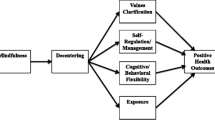Abstract
Since the 1980s, mindfulness techniques have been increasingly utilized in clinical psychology, often as an adjunct to cognitive or behavioral interventions and with a growing evidence base. According to a five-facet operationalization, mindfulness is a capacity to (a) observe, (b) describe, and (c) act with awareness of present moment experience, with a (d) nonjudgmental and (e) nonreactive attitude. The aim of this study was to identify which of the five facets of mindfulness predicts psychological well-being and symptoms of depression, anxiety, and stress in a community sample comprising nonmeditators and experienced meditators. Participants were recruited from meditation organizations (Vipassana and Zen) as well as undergraduate psychology students (N = 106). Participants completed a Web-based questionnaire assessing mindfulness, psychological symptoms, and well-being. A higher degree of the nonjudgmental aspect of mindfulness was found to predict lower levels of depression, anxiety, and stress-related symptomatology. A higher degree of the act with awareness of present moment experience aspect of mindfulness was found to predict lower depressive symptomatology. Improved knowledge of the relationship between specific facets of mindfulness and specific psychological symptoms may improve intervention development and the clinical use of mindfulness.
Similar content being viewed by others
References
Allen, N. B., Blashki, G., & Gullone, E. (2006). Mindfulness-based psychotherapies: a review of conceptual foundations, empirical evidence and practical considerations. The Australian and New Zealand Journal of Psychiatry, 40(4), 285–294.
Baer, R. A. (2003). Mindfulness training as a clinical intervention: a conceptual and empirical review. Clinical Psychology—Science and Practice, 10(2), 125–143.
Baer, R. A., Smith, G. T., Hopkins, J., Krietemeyer, J., & Toney, L. (2006). Using self-report assessment methods to explore facets of mindfulness. Assessment, 13(1), 27–45.
Baer, R. A., Smith, G., Lykins, E. L. B., Button, D., Krietemeyer, J., Sauer, S., et al. (2008). Construct validity of the five facet mindfulness questionnaire in meditating and non-meditating samples. Assessment, 15(3), 329–342.
Bowen, S., Witkiewitz, K., Dillworth, T. M., Chawla, N., Simpson, T. L., Ostafin, B. D., et al. (2006). Mindfulness meditation and substance use in an incarcerated population. Psychology of Addictive Behaviors, 20(3), 343–347.
Carmody, J., & Baer, R. (2008). Relationships between mindfulness practice and levels of mindfulness, medical and psychological symptoms and well-being in a mindfulness-based stress reduction program. Journal of Behavioral Medicine, 31, 23–33.
Chambers, R., Lo, B. C. Y., & Allen, N. B. (2008). The impact of intensive mindfulness training on attentional control, cognitive style, and affect. Cognitive Therapy and Research, 32(3), 303–322.
Dimidjian, S., & Linehan, M. M. (2003). Defining an agenda for future research on the clinical application of mindfulness practice. Clinical Psychology—Science and Practice, 10(2), 166–171.
Dryden, W., & Still, A. (2006). Historical aspects of mindfulness and self-acceptance in psychotherapy. Journal of Rational-Emotive & Cognitive-Behavior Therapy, 24(1), 3–28.
Easterlin, B. L., & Cardena, E. (1998). Cognitive and emotional differences between short- and long-term Vipassana meditators. Imagination, Cognition and Personality, 18(1), 69–81.
Hayes, S. C. (1984). Making sense of spirituality. Behaviorism, 12, 99–109.
Hayes, S. C. (2004). Acceptance and commitment therapy, relational frame theory, and the third wave of behavioral and cognitive therapies. Behavior Therapy, 35(4), 639–665.
Hayes, S. C., & Shenk, C. (2004). Operationalizing mindfulness without unnecessary attachments. Clinical Psychology—Science and Practice, 11(3), 249–254.
Hayes, S. C., Strosahl, K. D., & Wilson, K. G. (1999). Acceptance and commitment therapy: An experiential approach to behavior change. New York: Guilford.
International Wellbeing Group. (2006). Personal wellbeing index (Manual). Melbourne: Deakin University, Australian Centre on Quality of Life.
Kabat-Zinn, J. (1982). An outpatient program in behavioral medicine for chronic pain patients based on the practice of mindfulness meditation: theoretical considerations and preliminary results. General Hospital Psychiatry, 4, 33–47.
Kabat-Zinn, J. (1990). Full catastrophe living: Using the wisdom of your body and mind to face stress, pain, and illness. New York: Delacorte.
Langer, E. J. (1991). Mindfulness: Choice and control in everyday life. London: Harvill.
Linehan, M. M. (1993). Cognitive-behavioral treatment of borderline personality disorder. New York: Guilford Press.
Lovibond, S. H. (1983). The nature and measurement of anxiety, stress and depression. Paper presented at the 18th Annual Conference of the Australian Psychological Society.
Lovibond, P. E., & Lovibond, S. H. (1995). The structure of negative emotional states: comparison of the Depression Anxiety Stress Scales (DASS) with the Beck Depression and Anxiety Inventories. Behavior Research and Therapy, 33, 335–343.
Lykins, E. L. B., & Baer, R. A. (2007). Psychological functioning in a sample of long-term practitioners of mindfulness meditation. Journal of Cognitive Psychotherapy. In Press.
Ost, L.-G. (2008). Efficacy of the third wave of behavioral therapies: a systematic review and meta-analysis. Behaviour Research and Therapy, 46(3), 296–321.
Ostafin, B. D., Chawla, N., Bowen, S., Dillworth, T. M., Witkiewitz, K., & Marlatt, G. A. (2006). Intensive mindfulness training and the reduction of psychological distress: a preliminary study. Cognitive and Behavioral Practice, 13(3), 191–197.
Teasdale, J. D., Segal, Z. V., & Williams, J. M. G. (1995). How does cognitive therapy prevent relapse and why should attentional control (mindfulness) training help? Behavior Research and Therapy, 33, 225–239.
Thera, N. (1962). The heart of Buddhist meditation. London: Rider.
Author information
Authors and Affiliations
Corresponding author
Rights and permissions
About this article
Cite this article
Cash, M., Whittingham, K. What Facets of Mindfulness Contribute to Psychological Well-being and Depressive, Anxious, and Stress-related Symptomatology?. Mindfulness 1, 177–182 (2010). https://doi.org/10.1007/s12671-010-0023-4
Published:
Issue Date:
DOI: https://doi.org/10.1007/s12671-010-0023-4




